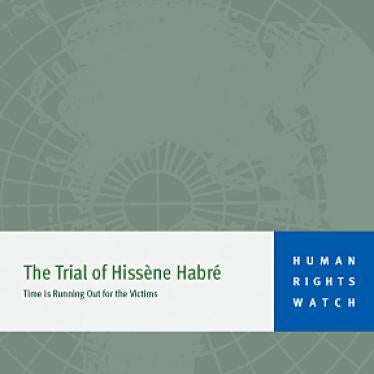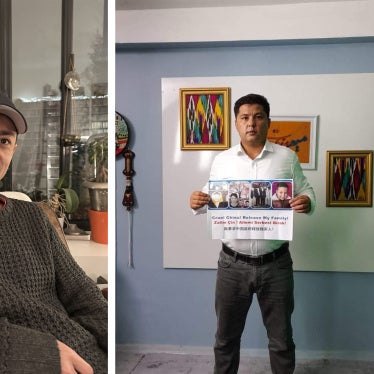(N’Djamena) - The Chadian government of Hissène Habré was responsible for widespread political killings, systematic torture, thousands of arbitrary arrests, and the targeting of particular ethnic groups, Human Rights Watch said in a study released today.
The 714-page study La Plaine des Morts (The Plain of the Dead), based on 13 years of research, indicates that Habré was personally implicated in the abuses during his rule from 1982 to 1990, principally by maintaining tight control over his feared political police, the Documentation and Security Directorate (DDS). The study is being published in French, with a summary available in English. Its publication comes five months after a special court in Senegal indicted Habré on charges of crimes against humanity, war crimes, and torture. The court is now gathering evidence that could lead to the exiled former dictator’s trial, and a second mission of the courts’ judges is currently in Chad.
“Habré wasn’t a distant ruler who ignored the massive atrocities carried out in his name,” said Olivier Bercault of Human Rights Watch, the principal author of the study. “We found that Habré directed and controlled the political police, who tortured and killed those who opposed him or those who simply belonged to the wrong ethnic group.”
The study is based on a detailed analysis of thousands of DDS documents recovered by Human Rights Watch as well as over 300 interviews with victims, witnesses, and former DDS agents conducted by Human Rights Watch and the International Federation for Human Rights (FIDH). The study does not reach a determination of Hissène Habré’s guilt or innocence of the charges against him, which will be decided by the special court.
Based on documents cited in the study, Habré created the Documentation and Security Directorate by decree, ordering it to be “directly responsible to the Presidency.” The agency’s four directors during Habré’s rule all came from the president’s inner circle. One was his nephew. In one unearthed memo, the DDS director proudly affirmed that the agency, “thanks to the spider’s web it has spun over the whole length of the national territory, keeps exceptional watch over the security of the State,” as the “eyes and ears of the President of the Republic", whose control it is under and to whom it reports on its activities.
An analysis of the documents by the Human Rights Data Analysis Group identified by name 12,321 victims of abuse, including 1,208 who were killed or died in detention. Habré was personally sent 1,265 direct communications from the DDS about the status of 898 detainees.
On February 8, 2013 the Extraordinary African Chambers were inaugurated in Dakar, Senegal, with judges from both Senegal and other African Union countries, to prosecute “the person or persons most responsible” for international crimes committed in Chad between June 7, 1982 and December 1, 1990. On July 2, the chambers’ investigating judges charged Habré with crimes against humanity, war crimes, and torture, and placed him in pretrial detention. The pretrial investigation is continuing. The prosecutor has named five other suspects who worked with Habré, two of whom are in detention in Chad on charges filed there. The others are at large.
Among the findings of the study:
· The abuses began as soon as Habré came to power in 1982, when he sent his forces to control the south, whose leaders opposed his rule. In the repression, culminating in “Black September” 1984, villages were attacked, pillaged, burned and destroyed. Educated Chadians from the south were systematically arrested and executed.
· The DDS maintained a network of prisons, the most notorious of which was La Piscine in Chad’s capital, N’Djamena, converted from a colonial-era swimming pool that was divided into cells and covered over with a cement slab. Prisoners died of malnutrition and disease in the overcrowded underground cells, especially in the unbearable summer heat, but the guards would sometimes wait until several detainees had died before clearing out the bodies.
· Membership in an ethnic group whose leaders were perceived to be a threat to Habré’s authority was often sufficient grounds for arrest, torture, and execution or enforced disappearance. In 1987, Habré created a commission to oversee the repression of the Hadjaraï group. Hadjaraï villages were burned and hundreds of people detained and killed. In 1989, after Habré’s Zaghawa allies, including the current Chadian president, Idriss Déby, broke with his government, Habré established a similar commission to crack down on the Zaghawa. A wave of arrests took place in 1989 in more than 40 localities, and hundreds were killed.
· In August 1990, Habré ordered the arrest of former government officials for secretly distributing anti-government leaflets and was kept abreast as they were detained under inhuman conditions, tortured, and in some cases died in prison. In a few cases, Habré even followed their interrogations via walkie-talkie.
“Hissène Habré was kept aware of the abuses even when he was not directly ordering them,” Bercault said. “Our research concludes that Habre’s agents who carried out the worst atrocities almost always went unpunished, and many were even promoted.”
Other groups that collaborated on the study include the Chadian Association for the Promotion and Defense of Human Rights (ATPDH) and the Association for Victims of the Crimes of the Regime of Hissène Habré (AVCRHH).






